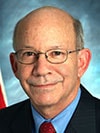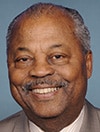“PSR in practice means the bottom line drives the decisions,” said Chair DeFazio. “Longer trains, unhappy shippers and a workforce pushed to do more with less is not a model to chase after – unless you’re on Wall Street. But we can’t let hedge fund managers write the rules of railroading. Last Congress, my Committee heard from various stakeholders concerned for the immediate and long-term impacts of PSR. This study, passed by the House last year in my surface transportation reauthorization bill, the INVEST in America Act, will help us find ways to address the impacts this railroad management strategy has on workers, freight shippers, passenger railroads and rail safety.”
“Precision scheduled railroading is being used more and more throughout the rail industry,” said Rep. Donald M. Payne Jr. “But I am concerned that this strategy could come at the expense of worker safety and smart, long-term railroad management. We need more information about this practice to determine whether it is beneficial or harmful to our nation’s railroad system.”
Read their letter making the request to the GAO. (PDF)
Tag: precision scheduled railroading
Amtrak’s financial situation and the freight rail industry’s continued use of Precision Scheduled Railroading (PSR) practices were the focus of a U.S. Senate Commerce Committee hearing Oct. 21.
Amtrak President and CEO William Flynn repeated his plea for almost $5 billion in emergency funding to help the nation’s passenger carrier weather the continued downturn in ridership caused by the COVID-19 pandemic. The carrier has made drastic long-distance service cuts, going from daily to three trips per week on many routes. Furloughs for almost 2,000 Amtrak employees are scheduled to take effect in November.
“Virtually all of the CARES Act money has been spent,” Flynn told the committee. “These workforce adjustments are essential with current financial funding.”
A number of legislative actions, including the HEROES Act and the INVEST in America Act, while passed by the U.S. House of Representatives, have been stalled by Majority Leader Mitch McConnell in the GOP-controlled Senate. The emergency funding provided by such legislation would help the carrier rebound, Flynn said.
“Once the pandemic eases, Amtrak plans to grow,” he said.
A second panel featured a discussion of PSR.
Rudy Gordon, CEO of the National Grain and Feed Association, expressed concerns from a shipper perspective about the redeployment of furloughed railroad workers, saying that he fears delays in service and shipments on the part of rail carriers when the economy rebounds.
PSR has caused “a tipping point” at the expense of customer service, Gordon said, and said that if rail service erodes further at the expense of the carriers obtaining lower operating ratios (ORs) that the Surface Transportation Board should intervene.
Larry Willis, president of the AFL-CIO Transportation Trades Department (TTD), of which the SMART Transportation Division is a member, offered written testimony concerning PSR.
“Across the sector, the pandemic continues to wreak havoc, threatening both the health and livelihoods of employees,” Willis stated. “At the same time, freight railroads, at the insistence of Wall Street investors and hedge fund managers, have pursued operating practices that undermine basic tenets of rail safety, ask frontline workers to do more with less, and threaten the reliable and efficient customer service that should be the hallmark of this industry.”
The lone labor representative invited to testify in person was Dennis Pierce, president of the Teamsters Rail Conference.
Other industry stakeholders appearing were:
- Paul Tuss, executive director, Bear Paw Developing Corporation and Member, Montana Economic Developers Association
- Frank Chirumbole, vice president global supply chain, Olin Corporation on behalf of American Chemistry Council
- Kent Fountain, chairman, National Cotton Council
- Ian Jefferies, president and chief executive officer, Association of American Railroads
In a move that carrier officials said was in reaction to the COVID-19 pandemic, Norfolk Southern has idled the hump yard at Linwood Terminal in North Carolina, costing more than 80 people their jobs.
NS told Trains Magazine May 1 that the “unforeseeable business circumstances” caused by the coronavirus will result in 85 jobs lost this month at the site, which has been open since 1979.
Norfolk Southern announced first-quarter revenue of $2.6 billion and net income of $381 million on April 29. The carrier said it took a $385 million loss during the quarter as it sold off approximately 300 locomotives and is in the process of selling 400 more as part of its Precision Scheduled Railroading plan.
“We are taking hard looks at our yard and terminal network, testing what we can live without,” Chief Operating Officer Mike Wheeler said during the carrier’s first-quarter earnings call.
Read the article from Trains Magazine (registration may be required).
Union Pacific also has curtailed operations at an engine shop in North Little Rock, Ark., for reasons identical to those cited by NS, the Arkansas Democrat-Gazette reported, also on May 1.
Workers at the Jenks Locomotive Facility began to be notified on April 30 of worker furloughs. Carrier representatives declined to disclose an exact number of employees affected to the newspaper but said the carrier would re-evaluate operations in a couple of weeks.
Approximately 1,100 people work at the facility, the newspaper reported.
UP reported $1.5 billion in net income for the first quarter during its earnings call April 23.
Read the Arkansas Democrat-Gazette’s report.
Earnings data for the majority of Class I freight carriers will be published on the TD website next week.
Union Pacific’s version of Precision Scheduled Railroading (PSR) claimed more victims recently.
UP announced last week that it was doing away with its Neff Yard in Kansas City, Mo., and with it 200 well-paying rail jobs evaporate.
The short-term benefits of these and other workforce reductions by carriers in the name of PSR result in a few more bucks for Wall Street shareholders — the end result of PSR for all to see.
Ignored is the long-term damage done to customer service as the carrier tries to adapt to the change it has made to operations, to equipment because of deferred maintenance, to the lives of employees – both those who are left jobless and those who have to work even harder to pick up the slack — and to the economies of communities in which those good-paying rail jobs have vanished.
UP’s not alone. Right around Labor Day at two locations in Pennsylvania and one in Virginia, Norfolk Southern cut nearly 300 jobs. What do the two carriers have in common? They’re both knee-deep in PSR.
SMART TD leadership backs Kansas State Legislative Director Ty Dragoo, who wrote a letter to explain to members of the general public about what the carriers are really doing.
We support the Kansas State Legislative Board’s efforts to preserve jobs in the face of carrier cuts and hope that other members of rail labor follow his lead. SLD Dragoo’s letter is reproduced below. He is not being silent, and we will not be silent.
Dear Editor,
America’s railroads are going through a round of job cuts. But at what cost? We, the public, are paying for significant Wall Street gains while selling out our communities.
Union Pacific has announced the closure of Neff Yard in Kansas City. Now you get to hold the bag as UP takes the money to the bank.
Union Pacific Railroad’s decision this week to abolish 200 positions at Neff Yard follows similar force reductions by the other major freight rail systems across the country.
The cuts aren’t coming because the company is losing money: Union Pacific in July 2019 reported 2019 second-quarter net income of $1.6 billion, or $2.22 per diluted share. This compares to $1.5 billion, or $1.98 per diluted share, in the second quarter of 2018.
“We delivered record second-quarter financial results driven by exceptional operating performance, including an all-time best quarterly operating ratio of 59.6 percent,” said Lance Fritz, Union Pacific chairman.
The cuts aren’t due to burdensome corporate taxes. Union Pacific disclosed in 2017 the estimated impact from the Tax Cuts and Jobs Act in a filing with the Securities and Exchange Commission. That disclosure saw some shocking amounts of money to the tune of $6 billion.
The $5.8 billion benefit comes primarily from the revaluation of UP’s deferred tax liabilities to reflect the new federal corporate tax rate of 21 percent.
Also, UP stated the tax break law would result in a $200 million non-cash reduction to its operating expenses. It is also of note that many states and local communities have subsidized Union Pacific with tax money.
The most-significant financial boost was Union Pacific’s much-lower tax bill for the reporting quarters. Operating income may have increased, which is impressive knowing that workers are responsible for that, but the company’s tax bill since passage has been substantially lower, which has led to a massive increase in net income for the quarters.
Despite taxpayer dollars and tax cuts helping Union Pacific gain more per-share for Wall Street, their way to say “thanks” seems to be, pack up and go. This is leaving behind an economic catastrophe for impacted communities to clean up for themselves. To add insult to injury, the company didn’t even have the decency to warn employees until a few days out.
The cuts are due to insatiable corporate greed. Union Pacific is one of the largest U.S. freight rail operators with annual revenues of more than $20 billion.
While communities struggle with basic needs, education, public utilities, streets, emergency services, food tax rates, sales tax, etc. all at the table for increase when UP wants its cut. You have been paying more while they cut and run. This is a double slap to the face; one we must be vocal about.
These job losses will ripple through the heart of the local economy. Without income and security, workers and families won’t be able to spend on clothes, restaurants, recreation, and much more. Union Pacific isn’t only undermining workers and families, but entire regional economies.
As we stand in solidarity with the Union Pacific workers who are about to lose their livelihoods, we can’t forget that corporate decisions in faraway places leave deep scars in unsuspecting communities. Not only do workers in these communities deserve gratitude, but we must also hold companies who take them for granted accountable. When communities invest in companies, we are investing in jobs.
We kept our promise. Will Union Pacific and other railroads continue to break theirs?
Sincerely,
Ty Dragoo
Kansas State Legislative Director — SMART TD
Members in Kansas and Missouri — please take a few moments of your time to tell the elected officials listed below about what you think about the carrier cash grab that is PSR.
CONGRESSMAN EMANUEL CLEAVER
D.C. OFFICE
2335 Rayburn HOB
Washington, D.C. 20515
Phone: (202) 225-4535
Fax: (202) 225-4403
Email him at https://cleaver.house.gov/contact/email-me
CLEAVER’S KANSAS CITY DISTRICT OFFICE
101 W. 31st St.
Kansas City, MO 64108
Phone: (816) 842-4545
Fax: (816) 471-5215
CONGRESSWOMAN SHARICE DAVIDS
D.C. OFFICE
1541 Longworth HOB
Washington, D.C. 20515
Phone: (202) 225-2865
Email her at https://davids.house.gov/contact/email-me
DAVIDS’ KANSAS CITY DISTRICT OFFICE
753 State Ave., Suite 460
Kansas City, KS 66101
Phone: 913-766-3993
KANSAS CITY COUNCILWOMAN KATHERYN SHIELDS
City Hall
414 E. 12th St.
Kansas City, MO 64106
Phone: 816-513-6515
Email: katheryn.shields@kcmo.org
KANSAS CITY COUNCILMAN ERIC BUNCH
Legislative aide Crissy Dastrup 816-513-6517
Email: Eric.Bunch@kcmo.org
KANSAS CITY MAYOR QUINTON LUCAS
City Hall
29th Floor
414 E. 12th St.
Kansas City, MO 64106
Phone: 816-513-3500
Email: MayorQ@kcmo.org
In the carrier’s quarterly earnings call April 18, Union Pacific Chief Operating Officer Jim Vena said that more cuts are being weighed as UP quests for a 61% operating ratio and continues its move toward Precision Scheduled Railroading (PSR).
During the call, the carrier also announced a “pause” in the construction of its $550 million Brazos Yard project in Robertson County, Texas, as UP reallocated funds to improve its El Paso, Texas-to-Loa Angeles line.
Vena said there would be more “rationalization” of the carrier’s network and terminals in order to increase train speed and that future hump yard closures are in the planning stages, according to the Supply Chain Dive news website.
UP is a third of the way through its “Unified 2020” plan to implement PSR, Supply Chain Dive’s Emma Cosgrove reported.
Read Supply Chain Dive’s coverage of the UP earnings call here.
A ruling is expected in January on whether a lawsuit by a trio of CSX shareholders who have sued the carrier’s board over the hiring of late CEO E. Hunter Harrison in 2017 can advance, the Florida Times-Union reports.
The 72-year-old Harrison sought an $84 million financial package when brought aboard from Canadian Pacific to lead the Jacksonville, Fla.,-based carrier in March 2017. Harrison began implementing his Precision Scheduled Railroad (PSR) strategy at CSX, resulting in reports of service disruption that led to a hearing before the federal Surface Transportation Board (STB).
Harrison died at age 73 in December, nine months after his hiring and just two days after the carrier had placed him on medical leave.
“CSX board failed to properly vet Harrison’s medical condition before agreeing to his demands involving compensation, reimbursement arrangements to be made with Mantle Ridge, and the addition of conflicted Board members,” the lawsuit claims. “Knowing that Harrison’s demands were extraordinary and outrageous, couple with their overriding fears concerning Harrison’s poor health, the Board resolved to see guidance from its shareholders and called a special meeting to do so.”
However, the lawsuit claims, after being influenced by CSX minority shareholder Mantle Ridge, the carrier’s board went ahead with the hiring and took the decision out of shareholders’ hands.
“Instead of taking proper steps to protect CSX and offload some of the financial risk of Harrison’s hiring, the board instead approved and disseminated false and misleading proxy statements to shareholders, and in doing so ensured that the outcome of the shareholder vote regarding the reimbursement arrangement was predetermined to favor Harrison and Mantle Ridge…” the lawsuit states.
More than 90 percent of CSX shareholders voted to support the reimbursements at the annual shareholder meeting in June.
“CSX’s Board knew about, hid and outright deceived shareholders about Harrison’s ill health and physical infirmities,” the lawsuit states.
The shareholders’ suit was originally filed in April 2018, dropped and then re-filed in mid-July. If Judge Kevin Blazs of Florida’s Fourth Judicial Circuit Court rules in favor of the shareholders, their lawsuit could move ahead to a jury trial, the Times-Union reported.
The lawsuit’s case number is 2018-CA-004625.
The Surface Transportation Board (STB) chairwoman has asked Norfolk Southern’s CEO to keep the board apprised as the carrier begins to add elements of Precision Scheduled Railroading (PSR) to its operations, Trains Magazine reports.
The letter from Ann Begeman, sent Nov. 27 to NS CEO Jim Squires, requests that the carrier begin weekly conference calls with the STB to report operational changes, the magazine reported in an article posted Nov. 29.
The requirement of updates from NS mirrors the approach STB has taken in handling another Class I that is trying out PSR.
Union Pacific (UP) announced in early autumn that it also had begun adopting aspects of PSR as part of its “Unified Plan 2020” initiative. PSR is a strategy by the late CSX CEO E. Hunter Harrison that he implemented at both Canadian National and Canadian Pacific and requires cargo to be ready when rail cars arrive for loading or risk being left behind, among other aspects. Both Canadian carriers reported financial benefits after these implementations.
When Harrison moved to CSX in early 2017 and began adding PSR to that carrier’s operations, CSX received substantial criticism from shippers amid reports of service problems as the year progressed. This drew the attention of STB and resulted in a hearing before the STB to address the carrier’s difficulties.
To avoid a repeat of those problems encountered by CSX, a letter from the STB sent in September to UP sought weekly updates on the implementation.



